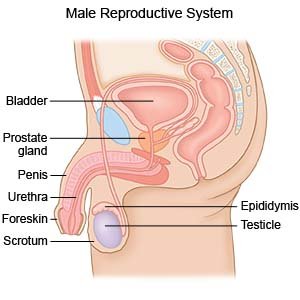Prostate Gland Needle Biopsy
Medically reviewed by Drugs.com. Last updated on Aug 4, 2025.
A prostate gland needle biopsy is a procedure to remove samples of tissue from your prostate gland. The prostate is a gland located just below the bladder and surrounds the urethra (tube that carries urine out of the body).
 |
DISCHARGE INSTRUCTIONS:
Seek care immediately if:
- You bleed from your rectum.
- You urinate very little or not at all.
- You have severe pain, even after you take pain medicine.
Call your doctor or surgeon if:
- You feel pain or burning when you urinate.
- You feel weak, and your face is hot and red.
- You have a fever or chills.
- You see blood in your urine, bowel movements, or semen.
- Your urine is cloudy or smells foul.
- You cannot get an erection.
- You have questions or concerns about your condition or care.
Related medications
Medicines:
You may need any of the following:
- NSAIDs , such as ibuprofen, help decrease swelling, pain, and fever. NSAIDs can cause stomach bleeding or kidney problems in certain people. If you take blood thinner medicine, always ask your healthcare provider if NSAIDs are safe for you. Always read the medicine label and follow directions.
- Antibiotics help treat or prevent an infection caused by bacteria.
- Prescription pain medicine may be given. Ask your healthcare provider how to take this medicine safely. Some prescription pain medicines contain acetaminophen. Do not take other medicines that contain acetaminophen without talking to your healthcare provider. Too much acetaminophen may cause liver damage. Prescription pain medicine may cause constipation. Ask your healthcare provider how to prevent or treat constipation.
- Take your medicine as directed. Contact your healthcare provider if you think your medicine is not helping or if you have side effects. Tell your provider if you are allergic to any medicine. Keep a list of the medicines, vitamins, and herbs you take. Include the amounts, and when and why you take them. Bring the list or the pill bottles to follow-up visits. Carry your medicine list with you in case of an emergency.
Eat a variety of healthy foods:
Healthy foods include fruits, vegetables, whole-grain breads, low-fat dairy products, beans, lean meats, and fish. Eat foods low in animal fat and saturated fats to help decrease your risk for prostate cancer.
Follow up with your doctor or surgeon as directed:
Write down your questions so you remember to ask them during your visits.
© Copyright Merative 2025 Information is for End User's use only and may not be sold, redistributed or otherwise used for commercial purposes.
The above information is an educational aid only. It is not intended as medical advice for individual conditions or treatments. Talk to your doctor, nurse or pharmacist before following any medical regimen to see if it is safe and effective for you.
Further information
Always consult your healthcare provider to ensure the information displayed on this page applies to your personal circumstances.
